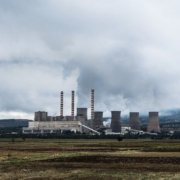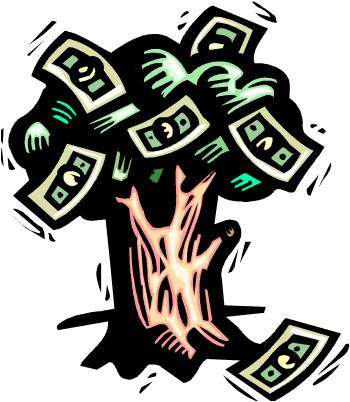Selling the Steady State Economy
by Gary Gardner
The looks I get are familiar at this point: the blank stare screaming What do you mean, a no-growth economy? The frown of doubt that silently demands, Are you crazy? This is how skepticism about degrowth and steady-state economics manifests in my own life.
The work of a steady-state proponent is not for the faint of heart, to be sure. Steady state economies are sorely needed today but are far from being widely understood, much less adopted. Yet we’d better become more skilled in promoting the cause, because we don’t have decades to build mass support for it (unless we’re willing to settle for a much smaller steady state with a threadbare cupboard of natural capital).

Say what? (Oleg Sklyanchuk, Flickr)
How can we talk about degrowth, steady state economies, doughnut economics, and the like in a way that gets a hearing? Here are a few thoughts from my experience.
Play the Logic Card
The first step is to use simple, irrefutable logic: Infinite growth is not possible on a finite planet. Economic activity requires resources, from water to lumber to iron ore, that exist in finite supply. People with common sense readily grasp this self-evident truth. (But note must be made of economist Robert Bradley’s straight-faced observation that “Natural resources originate from the mind, not the ground, and therefore are not depletable.” So there’s that.) Yet even as skeptical friends concede the point of resource finitude, they also seem confident that their quiver of counterarguments remains full. Any number of objections flow forth, all deserving of a hearing and a response.
A common initial objection is that “nobody actually says we should grow forever.” True enough; “infinite growth” seldom appears in national economic policy statements. But it’s there by default, in the absence of any mention of an endpoint to growth. Rare is the prime minister or president who declares, “We’ve grown enough and now must stop,” or “Our goal is to grow for the next five years, then be done.” A refreshing exception is the president of Ireland, Michael D. Higgins, who lamented last week that “Many economists remain stuck in an inexorable growth narrative…” and who called for an effort to “rebalance economy, ecology and ethics.”
Most political leaders uttering messages like these would surely be looking for new work soon. But in their insistence on growth and their fierce resistance to discussing a no-growth economic future, they might as well declare, “Growth forever!” So when skeptical friends play the “nobody says infinite” card, challenge them to name any political or business leader—beyond Higgins—who even hints at an expiration date for growth.
“Permanent Despair?”
Another objection is that a steady state economy suggests permanent recession, an ongoing downward spiral of despair. This misconception is likely rooted in the loose definition of recession: “a marked slippage of economic activity.” But while degrowth would indeed mean a brake on economic activity, it would not be applied haphazardly but designed to establish patterns of nature-bounded resource use. This would be done by, as one policy example, adopting cap-auction-trade systems in the commons sector for allocating basic resources, the caps being based on biophysical limits.

SSE: neither excess nor want (US Forest Service)
To be clear, a steady state economy can and should advance development, defined as qualitative development that requires no increase in throughput. Brian Czech and Herman Daly wrote two decades ago that a steady state economy would involve a reorganization of economic activity, not an across-the-board slashing of it: “…organic farms may supplant factory farms, the proportion of bicycles to Humvees may increase, and professional soccer may attract more fans while NASCAR attracts fewer. As long as the physical size of the economy remains constant in the long run, a developing economy is a steady state economy.”
Of course, we could all be poor and despairing in a steady state economy. But that depends on the endowment of natural capital we have to work with, which in turn depends on how soon the world’s economies stop liquidating that endowment. The point for skeptical friends is that while despair and impoverishment are possible in a steady state economy, they are certain if we maintain our current course, because ongoing liquidation of natural capital is a regular practice of economies today.
“Aren’t We Already on It?”
Other friends, attuned to the structural makeup of modern economies, object that growth need not mean material growth, that GDP can grow without adding to resource use. Firms are forever finding new ways to increase the efficiency of their operations, for example. Economic activity is increasingly shifting to services—banking, insurance, dry cleaning, and the like—whose resource footprint is less than that of goods. Won’t innovations like these, which strive to do more with less, end the need for mines and landfills, reduce our materials footprint, and deflate the argument for steady state economies?
No as much as you’d think.
Resource efficiency can be helpful but it doesn’t necessarily lead to lower levels of resource use overall. Total resource use grows even as efficiency increases, whether because population increases, people on average boost their consumption, companies aggressively pursue growth, or because developing more efficient technology requires growth with previous (less-efficient) technology. These characteristics are all in play in much of the world, so expect efficiency increases to be regularly and systematically undercut by these dynamics. Make sure your friends understand this often-overlooked truth.
Growth’s Appetite
Here’s a recent example of growth undercutting efficiency: Last month, Starbucks proudly announced expansion of its “Greener Store” program, which it claims reduces water and energy use by 30 percent compared to historic store practices. But if the company also expands as it did in the past decade, nearly doubling the number of Starbucks properties, its growth would offset efficiency gains, and then some. From a resource-saving perspective, Starbucks would be better off shelving its Greener Store program and instead committing not to open new stores (and not to increase sales in any way). Of course, its best course of action would be to do both, to increase efficiency and stop growing.
The message for your friends: Efficiency may be helpful, but it’s sure not the same as conservation, which requires a capping, if not a reduction, in total resource use. Which companies can claim to have achieved that?
Even activity that seems nonphysical has a real physical impact. What could be more immaterial than Bitcoin, whose very essence is algorithms and mathematical formulae? Yet the computations at the heart of cryptocurrency operations require the enormous computing power of servers housed in warehouse-sized buildings. Bitcoin alone consumes more energy than all of Norway does in a year.
The fact is that all activity requires energy and resources. Even meditating on a mountaintop requires food energy for the meditator. Challenge your friends to find the energy and materials in supposedly “dematerialized” economic activity, because they’re there.
“Plenty of time, Cassandra!”
Other skeptics assume we have time to figure things out. Any environmental and social catastrophes created by incessant growth are decades or centuries in the future. In this perspective, a steady state economy is a rash and reckless response to distant and avoidable crises.
The truth is that we are driving off environmental cliffs today, not in some distant future. Every environmental headline represents economic activity whose side effects could not be absorbed by nature. Some of these are local and easily resolved: a polluted river can be healed by applying filters that can prevent discharges. But a growing number of challenges are global in scope and have no simple technological fixes. These include climate change, species loss, and the creation of the ozone hole. Spin-off effects of climate change like sea-level rise and ocean acidification are also global in extent. Water scarcity, soil erosion, deforestation, and air pollution manifest independently across our planet, but their occurrence on every inhabited continent makes them effectively global.
In sum, we experience large-scale excesses never seen by any previous generation, all of which are driving catastrophes-in-the-making. Point to the evidence and ask your friends: Is the cliff miles down the road, or directly ahead?
Go on Offense, Positively
Perhaps the most powerful argument available to proponents of the steady state economy is that re-made economies could increase our wellbeing. Far from resigning ourselves to a grand sacrifice, we could be signing on to, on balance, a happy advance. Degrowth would allow us to recover from the addiction to consumption, as people would no longer use purchases to satisfy needs for affection, self-esteem, and self-actualization. It could also bring an end to mass poverty and ease societal stresses, because of the equity emphasis found in steady state economies. Meanwhile, the natural environment would begin its long road to recovery.

A typical Tuesday afternoon, maybe? (Minneapolis2040 Ted Eytan CC BY-SA 2.0)
Dangle these advantages in front of friends. Make it real. Ask if they, like many people surveyed, would choose more time off over a salary increase, if given the option. Have they ever wondered why nobody swims in the river in their city, and wouldn’t it be a great amenity if everyone could (as promised in the 1972 Clean Water Act)? Have they noticed that their windshields are no longer covered with bugs after a long summer drive (as they were decades ago), if they can understand this as representative of widespread species loss, and if this shouldn’t be a high priority for correction. And do they really believe the current course of frequent environmental catastrophes, social stress, and growing inequality can continue, and if this is a world they want to live in.
Our Time
The debate over a steady state economy is one we can win. And it’s increasingly relevant as environmental and social catastrophes multiply in scale and frequency. While crazed looks from skeptical friends may still be the norm, progress is evident. Look at the commitments of Amsterdam, Copenhagen, and Barcelona to set maximum and minimum limits, using principles of doughnut economics. These advances are built on a base of popular support, advances that can energize our own evangelizing efforts. If we learn to develop effective talking points and internalize inspirational examples, we’ll be ready to meet the moment unfolding before us.
Gary Gardner is CASSE’s Managing Editor.










Hi Gary,
I enjoyed your article and suggested talking points in favor and in defense of steady state economics. And, I agree with them. The one that appeals to me is simply the logical one. If growth means using up more and more natural resources without foreseeable limits placed upon this use, growth based economic theory and practice makes little sense to me. Unfortunately, “steady-state” economics appears to be for many a “theory” and all theories are open to be questioned and even rejected. As for “de-growth” that just appears to be politically motivated activist movement. A movement I’m not against I just want to add. The question we need to ask ourselves and those who might reject steady-state and degrowth policies, programs and projects is why might people reject them. Your article begins to address this why and I applaud this. But, if we dug deeper we all might be surprised at how deep this why goes. For example, you mention that “we can all be poor and despairing in a steady-state economy”; to be sure. And, the degree depends upon the natural capital we draw upon. But “growth” all by itself seems to answer this scenario; more and more efficient resource use, so we’re back to the “logic” argument. Or are we?
I think we need to bring in the human factor here; not just thermodynamic-ecological one. What would a steady-state/degrowth economy mean? For me, it would mean transitioning to a kind of economy that does not, in fact, function, the way the capitalist system does, as a radical plutocracy, rather as one that equitably and ecologically sanely provisions us. That is an ethical-political, dare I say a spiritual question.
Thanks, Nicholas. I agree that the human factor is key, and the topic of a future post! Ethical-political, and spiritual, indeed!
Nice try, Gary. Thank you for it. Not that it will settle all arguments. For one thing, the pragmatist will say we’re still good for the “forseeable” future.
A key weakness in the s-s argument, to me, is that no credible scenarios are put forward for a transition and how it would work. The Starbucks example makes the point: How does asking Starbucks to stop growing agree with an efficient, competitive economy? Is every economic activity to be subject to an auction with defined caps? How would we get from here to there? Is a partial implemetation feasible?
My answer to that last question: That the ‘conversion’ to s-s needs to be wholesale (since everything connects with everything else) is one of the impediments to winning the argument.
Another motivator I suggest is Tim Jackson’s 2021 book, Post-Growth – Life after Capitalism. It opens sevarl vistas of a better life after we shed the growth obsession.
Thanks, Erwin. I agree wholeheartedly that we have not done a great job of painting a picture of life in the steady state economy. Undoubtedly this is in part because it is hard to know with certainty what the many dimensions of a wholesale overhaul would look like. It will also look different in a transition phase of degrowth than it will in the phase of a settled steady state economy. And it could manifest differently in different parts of the world. So there is no single picture to paint. Still, I agree that we need a much deeper visioning of the product we’re selling!
I agree with you Erwin and Gary. Steady-state economics is both a theory in the scientific sense and a Vision. But it needs practical foundations. Trying to “sell” it within the context of today’s dominant economic paradigm is almost impossible unless we work on many fronts to form viable transition economic structures that help us to moves towards an actual steady-state infrastructure. What would that look like? How would we garner the commitments and support we will need for these structures to come into existence?
I live in Vermont and have been working on using what we have here already( and to add more) to build genuine, sustainable, just, community economic systems. Ostensibly, it is an economics of solidarity, but based on using a kind of community service credit( not conventional money solely) that binds( and “funds”) all labor into a solid network for producing real, supportive wealth. Frankly, it is a radical and very bold idea aimed primarily at awakening us to our need for community which reflects our need for one another. Fortunately, I’m beginning to gather interest and momentum to help develop it in theoretical and practical ways.
Thanks for all the great comments!
Excellent. Thank You.
Great 2 minute video: Robert F. Kennedy challenges Gross Domestic Product
Thanks, Mike. I’ve read snippets, but have never heard the whole excerpt. Very moving. Thanks!
I agree with the above comment. I expect, once understood most people will want to move towards a steady state, less work, less wasteful consuming, a peaceful future proofed planet, what’s not to like? The weakness is explaining the transition.
There are growing numbers of participants willing to spearhead a transition given a compelling vision, a clear path with defined action steps towards a fair sustainable planet.
Here’s a plan, what improvements can we add to it?
1. Change a local business to worker owned coop.
2. Donate portion of profits to common benefit causes, hospice, homeless shelters, poverty aid.
3. Reward your customers reputations for supporting your businesses. Start with loyalty cards, 1 star to 5 star loyalty ratings. Develope this scheme into a visible reputation sharing scheme openly viewable on customers social media, email footers etc.
4. Ensure that the coop is striving to encourage sustainable practices on its own activity, and make this measurable and viewable.
5. Develope the customers reputation sharing scheme to enable them to audit all of their their purchasing for carbon costs. They can then build their reputations by supporting cooperative suppliers and by caring for the planet.
6. Encourage competing coops to establish and flourish assisted by a talent exodus from the old growth economy alongside legacy donations from philantrophy and wills.
7. Take a rest and watch competing cooperatives, competing with one another to deliver a better world supported by a growing community of caring consumers that drive a culture shift towards a peaceful fair sustainable world.
Conor
Great comments but here comes the but..competitive co operatives,
consumption? I think we have a major world population first and
the segment that is currently suffering the most is the have nots
but if we can only get them out of poverty and get them up to better
position in life everything will be fine. Right ? But that will mean more
consumption of some portion of unsustainable form. There is no free lunch. We are the only living species that tries to live outside
the living sustainable live cycle of nature as it exists on earth.
SS provides a longer time frame for us to exist here but it is not
the fix of our demise sometime in the future. Even SS requires
some use of non renewable resources.
John Steinbeck quote of “temporarily embarrassed millionaires”
seems to still be in play with a strong dose of hedonism.
Onwards and downwards.
Tim, the scenario I envisage is of a competitive market dominated initially by worker coops, evolving to become commonly owned coops.
These suppliers would thrive and survive on the reputation they have with their supportive ethical consumers. We behave very differently when our reputations are visible, we are responsible and cooperate to gain acceptance among our peers. In a competitive setting, cooperatives will compete to survive on their reputation. Instead of competing for profit to grow, they will compete to deliver our demand for a sustainable world. The successful suppliers will be the ones encouraging us to consume less, sustainably, – while competing to provide us the means to do so.
Very interesting, Conor. What you envision is a way to get to a civic/community spirit, one that is paradoxically based on a kind of “competition” for social/ethical recognition towards a sustainable and just world. This was, I believe, the vision that Rousseau also had( back in the 18th century) and is also probably behind a lot of current philanthropic support by the uber rich. But, Tim is pointing out something different; in the great, grand scheme of things, it is true, there is “no free lunch” and species do go out of existence. But, I will like to remind my fellow human beings; it is not so much that we strive to exist forever; what is important is the manner of how we learn to together until that day comes; what kind of life can we live up until then? I think we have the time and the current resources to make it much, much, better!! At the very least!
Gary’s piece does what I think we need a lot more of on the road toward a steady-state economy. I look forward to future pieces as Gary suggests will come.
Turning to the content, I don’t think we should be promising too much from a steady-state, such as major progress against poverty, societal stress, or local pollution. Other social movements can work on these more directly, although we could link to them.
Steady-state issues most basically addresses resource depletion and climate change. More indirectly are shorter work hours and a more relaxed pace of life — for many people along spiritual lines (such as communing with nature. Also (actually directly related to steady-state), people’s unhappiness in so often tossing away objects that worked okay and that they had developed an attachment to. I’m sure many people hate the plethora of advertising blaring at them and especially being nagged by their children to buy the latest unnecessary stuff.
We should do our best to analyze and strengthen our arguments, especially concerning well-being which Gary says are “perhaps the most powerful” available to us.
Nick,
Thanks for that reply, initially I felt the solution was with competing commonly owned supplier organisations supported by ethical consumers, however I concluded that not enough consumers were motivated to switch their economic demand away from best immediate convenience, and price.
On reading Martin Nowaks book (harvard) supercooperators, it explains that sharing visible reputations overwhelmingly increases group cooperation. He uses biological examples with mathematical modellling to prove his analysis.
My idea is that by applying this concept to individual consumers within an open market, utilising current apps aided by arrival of AI, can ethical consumer behaviour flourish within a culture of personal responsibility? Can the not for profit sector then grow, and replace the perpetual growth system? I don’t know of any other ideas that can explain a pathway away from ongoing growth and towards a sustainable future.
I have noticed oneproject.org which has Justin Rosenstein previously of Google as a founder. They are exploring cooperative solutions and have built a vision of a cooperative future being the solution. In there vision I don’t see any workable pathway away from the momentum of capitalism.
It is by introducing this concept of harnessing responsibility of the individual, via reputation building and sharing and that provides the hope. This is what will put wheels on the wagon.
Consumers caring for and sharing their individual reputations can virally transform society into one which consumes and recycles responsibly, while supporting a supplier network of commonly owned producers.
These producers in turn, compete for the ethical consumers support, by delivering and encouraging sustainable, and life enhancing consumer behaviour.
Thanks for the conversation Nick, Conor
And, thank you, Connor. You bring up very interesting ideas concerning “human nature” if I may add to what you are proposing. Can human beings live socially isolated lives? The overwhelming evidence says emphatically NO! So, we are deeply, intrinsically social beings and this means that living in community is what needed and is the solution. And community means we behave responsibly towards one another instead of focusing only on the Me. I don’t need mathematical proof of this nor do I believe anyone else does either. What we need is a way to awaken more people to this need for the other and to be for the other in advanced capitalist societies which has a radically eroded and antagonizes community commitments. But, you’re right capitalism has a powerful momentum that shapes anti-social and anti-community reformation. To use a competitive means to gain an “ethical, responsible social reputation” in order to gain an economics and a politics of community seems interesting and perhaps worthwhile to explore as was apparently done by Martin Nowaks. I need to look into this work. But, I’m not all that sure it will work or as you put it “put the wheels on the wagon.”But, it might help. I’m working on an ideas that do two things, help to awaken our need for one another, doing so through practical means to give recognition to community service work that builds and sustains real wealth( needed services and products). The basic idea is to use a form of real credit( a community service credit) that gives social recognition. that at the same helps to build a just, locally based, and ecologically sustainable economics of community that gives real access to that wealth cooperatively produced. This is not the current system we have in the Market domain, but it is potentially is in wealth producing domain that we currently have. We need real ways to stop producing and consuming things we don’t need in order to provide for things and services that we do.
Thank you.
Hi Nick, agree that the key component of social recognition or personal reputation sharing is the key driver of responsible activity. Few people would drop an apple core on the pavement as others would see that, and personal reputation would be damaged, however we all drive cars emitting carcinogens and Earth damage. There is no proportional harm to personal reputation while doing so. First movers, once its importance is accepted, can embrace this concept of reputation sharing. Others on the edge of their group, notable by their absence, may join in.
These responsible consumers can then support your local community initiatives or maybe larger global community initiatives, lets call it commonly owned cooperatives.
Community can be built by working for and supporting, taking pride in running the commonly owned coopreratives.
These organisations can then compete to encourage and deliver our sustainable solutions.
The bit I like is that these organisations are at the behest of their supporting consumers. A kind of democracy. Western democracies cannot reject the concept as freedom is at its core. Autocratic regimes may like the concept as it drives responsibility for all into the centre of economic decision taking enabling the authority to step back, confident that society can self manage.
Your idea of a community service credit, delivering economic currency and social standing is a similar result to what I envisage. Its about imagining and enabling the transformation from where now to that point.
The recognition of the power of visible reputation sharing, for me, is the first step along the way.
Gary, I like the idea of trying to visualize a steady state economy. Since others have asked for visualization of the transition, I’ll skip that, but there are details of a steady state economy that I sure would like to see addressed.
1. Nation-states need growth to compete with each other. The larger economy can afford more military, and therefore has incentive to use force to capture the former competitor. Therefore, leaders must incentivize growth within their nations. So infinte growth trickles down. How do you stop this multi-polar trap at the global top?
2. Similarly, without a solution to the international multi-polar trap, how do you stop a rival nation from plundering the resources your nation has unilaterally decided to conserve? You might be able to defend your own territory, although not on bicycles, but you can’t defend the oceans or Antarctica, or stop the production of greenhouse gases.
3. If loans had to balance assets, that would relieve the bubble of money creation out of “thin air”. But private banks need to charge interest to compensate for their assumption of risk. Interest doesn’t correspond to an asset, so you still get musical chairs causing bankruptcy for some and riches for others. Not sure national banks solve the problem, because it just means the government – and therefore the taxpaying citizenry – assume the risk. So what happens to the financial system?
4. Co-ops and reputation trading still fail to compensate unpaid labor. That includes the “care economy” – moms, children of aging parents, etc. It also includes volunteer work. My borough’s council is all volunteer. Volunteer councilmembers ought to have free access to babysitters, right? I’m sure there are other cases of unpaid labor that still fall under the radar.